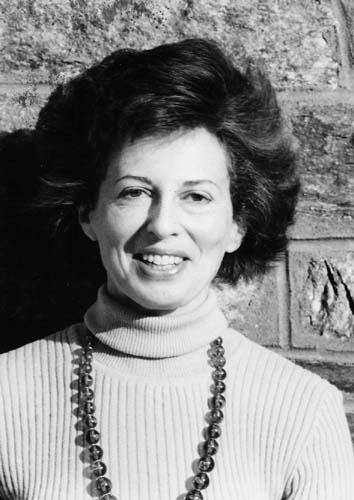 My mother, Maya Pines Froomkin, died yesterday morning. Like her, my brother Dan is a journalist, and he wrote this obituary:
My mother, Maya Pines Froomkin, died yesterday morning. Like her, my brother Dan is a journalist, and he wrote this obituary:
Maya Pines Froomkin, an accomplished journalist and author who wrote with great clarity about complex topics in psychology, child development, brain research, and the medical sciences, died Sunday at age 96.
Writing as Maya Pines, she was the author of two acclaimed books: “Revolution in Learning: The Years From Birth to Six” in 1967, which made the case for greater intellectual stimulation for the nation’s young children; and “The Brain Changers” in 1973, about advances in brain research.
She also co-authored two books: “Health and Disease,” with scientist Rene Dubos in 1965; and “Retarded Children Can Be Helped,” with photographer Cornell Capa in 1957, which was the first book written about parents who advocated for their children with intellectual disabilities.
She had a long and celebrated career as a freelance writer for top publications, including Life Magazine, Harper’s, the New York Times Magazine, and the Washington Post Book Review. She was a staff writer at the New York Times in 1982, and was a contributing editor to Psychology Today in the mid-to-late 1980s.
She retired in 1998 after 11 years as senior science editor at the Howard Hughes Medical Institute, where she wrote and edited highly regarded booklets aimed at the general public describing enormous advances in the biomedical sciences, including human genetics, cell structure, and the senses. More than a million copies of those publications were distributed, many to high school and college classrooms.
Her particular gift was her ability to explore and understand complicated topics, and convey what she had learned in graceful but also utterly accessible language.
Maya Pines was born in Berlin in 1928 to Russian Jewish parents who soon fled Germany. She spent her childhood in Paris and then London. She and her London classmates were evacuated from the city in anticipation of Nazi air raids in September 1939. But because her family was awaiting a berth on a U.S-bound lend-lease ship, she returned to London and was one of the few children there during the Blitz itself, which began in August 1940. She and her family left for the U.S. in November 1940. The ship she traveled on was sunk by German U-boats on its return journey.
A precocious child, she briefly attended Forest Hills High School in Queens, N.Y., entered Barnard College at age 15, and graduated from the Columbia School of Journalism in 1949 at age 21.
Her first job was at the Women’s National News Service, which syndicated articles about and for women to newspapers across the country.
She began work as a reporter at Life Magazine in 1956, writing about psychology and culture for what was then the preeminent magazine in America. A prized photo taken at a glamorous Life cocktail party shows her standing next to photographer Gordon Parks and artist Salvador Dali.
She became a freelance writer after the birth of her first son in 1960, and developed a great interest in telling stories about overcoming adversity. She once wrote that her favorite magazine piece was one called “Superkids” that ran in Psychology Today in 1970, about why some children sail through the most horrendous difficulties without obvious damage. She found that one common attribute was that they had at least one adult who cared for them in a special way.
Another favorite article, published in the New York Times Magazine in 1965, was about the success of an “extraordinary learning device” called a “talking typewriter” – a long-ago precursor to modern educational software. She was a frequent contributor to the Times Magazine, where she also wrote about the brain, stuttering, and her family’s experiment with vegetarianism.
In 1982, she briefly covered the behavioral sciences beat for the New York Times until she realized, as she once explained, “that it required actually living in New York.” Her home was in Washington. Nevertheless, she published memorable articles in the Times about narcissism and John Hinckley.
Over the years, she wrote about how to pick a psychiatrist for Harper’s; about genetic profiling for Smithsonian; about anti-depressants for Cosmopolitan; about how children learn to talk for Redbook; about mental health for Vogue; about mammograms for Savvy; and about good foods for your brain for Reader’s Digest.
Her first name was the answer to a New York Times crossword puzzle in 1990: “Author Pines”.
Her husband of 59 years, the economist Joseph Froomkin, died in 2019. She is survived by two sons and three grandsons: Michael, a law professor at the University of Miami in Coral Gables, Fla.; Dan, an independent journalist and media critic in Washington D.C.; David; Benjamin; and Max.

I’m sorry for your loss. Your mother seems to have been an extraordinary woman.
Mother, oh mother, come shake out your cloth!
Empty the dustpan, poison the moth,
Hang out the washing and butter the bread,
Sew on a button and make up a bed.
Where is the mother whose house is so shocking?
She’s up in the nursery, blissfully rocking!
Oh, I’ve grown as shiftless as Little Boy Blue
(Lullaby, rockaby, lullaby, loo).
Dishes are waiting and bills are past due
(Pat-a-cake, darling, and peek, peekaboo).
The shopping’s not done and there’s nothing for stew
And out in the yard there’s a hullabaloo
But I’m playing Kanga and this is my Roo.
Look! Aren’t her eyes the most wonderful hue?
(Lullaby, rockaby, lullaby loo.)
Oh, cleaning and scrubbing will wait till tomorrow,
But children grow up, as I’ve learned to my sorrow.
So quiet down, cobwebs. Dust, go to sleep.
I’m rocking my baby. Babies don’t keep.
Am I the only one who thinks this is weird?